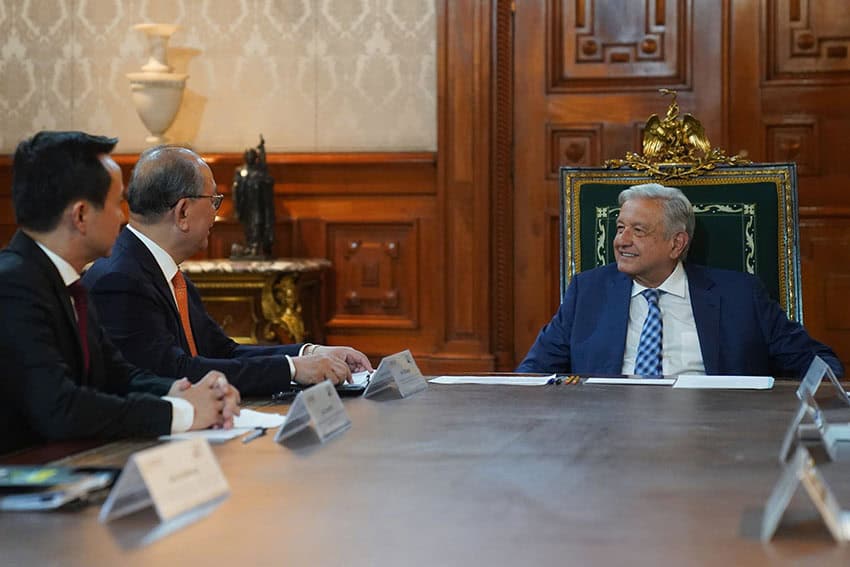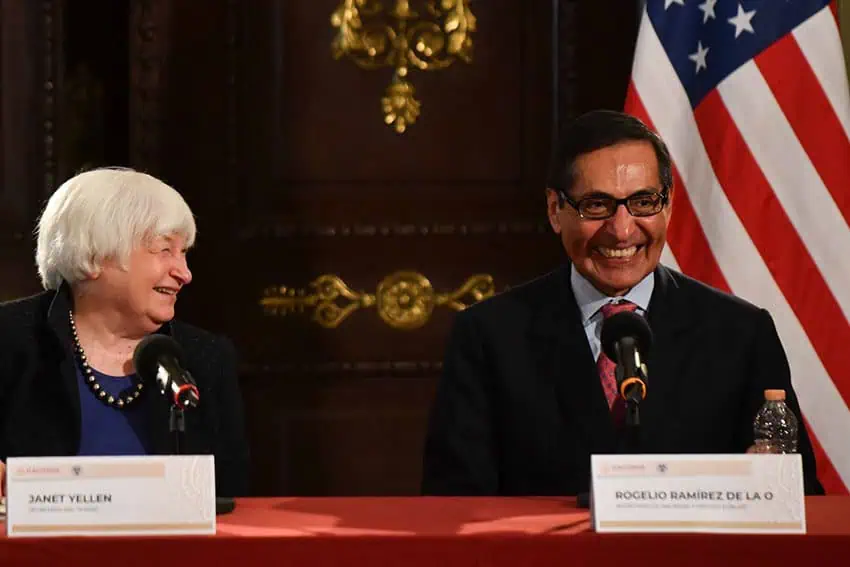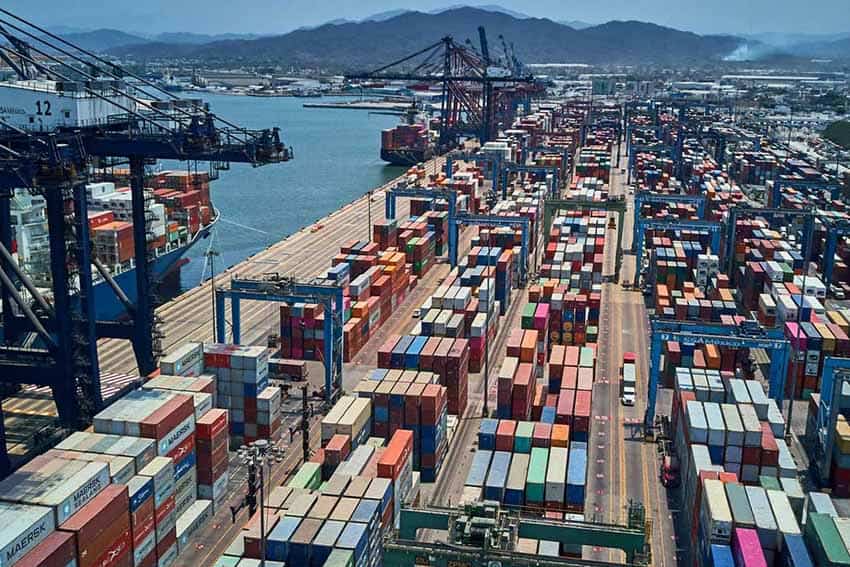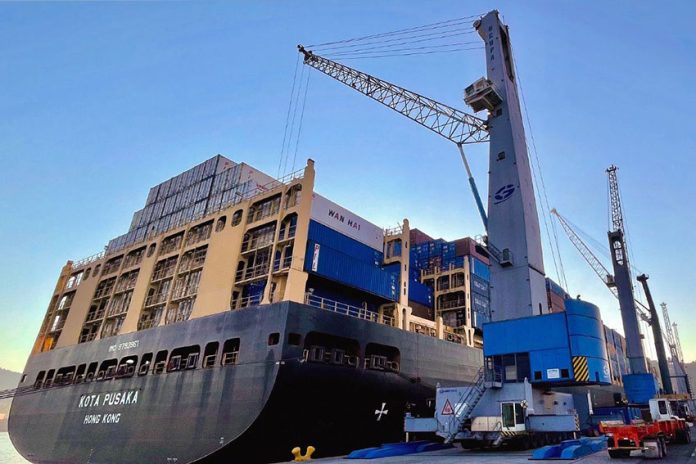The federal government has implemented new tariffs on hundreds of imports from countries with which it doesn’t have trade agreements, a move that appears mainly directed at China.
In a decree published on Monday, the government said that 5-50% tariffs would apply to 544 products across a range of categories including steel, aluminum, textiles, wood, footwear, plastics, chemicals, paper and cardboard, ceramics, glass, electrical material, transport material, musical instruments and furniture.

The tariffs — which took effect on Tuesday — will apply for two years, according to the decree, which was issued by President Andrés Manuel López Obrador, Finance Minister Rogelio Ramírez de la O and Economy Minister Raquel Buenrostro.
Products from countries with which Mexico has trade agreements — including the United States, Canada, European Union nations and CTPPP signatories such as Australia, Chile, Japan and Vietnam — will not be affected by the new tariffs.
Buenrostro said Tuesday that the government’s aim is to “prevent unfair competition.”
“We have seen a lot of products coming [into the country] … at a very low price and displacing our national producers,” she said at a Council of the Americas event in Mexico City.
“… The prices for the public don’t go down, but [cheap imports] are displacing textile makers, footwear makers [and other manufacturers],” Buenrostro said.
The economy minister said that the imports of concern come from countries with which Mexico doesn’t have trade agreements. She didn’t specifically mention China but did say that the “undervalued” imports mainly come from Asia.

The government’s decree said that the decision to implement the tariffs — most of which were set between 25% and 35% — was made in consideration of a range of things, including the need to “provide certainty and fair-market conditions to all sectors that face situations of vulnerability, in order to allow the recovery of national industry, promote its development and support the internal market.”
It also said that the federal government has an “obligation to implement the necessary mechanisms that generate stability in national industry sectors and that allow trade distortions to be eliminated.”
In addition, the decree said that “due to the growing implementation of new trade models at the global level, such as the case of relocation (nearshoring), … it is necessary to implement concrete actions that allow a balanced interaction in the market, to avoid economic distortions that could affect the relocation of productive sectors that are considered strategic for the country.”
The government also said that the tariffs were aimed at “maintaining the competitiveness of the most sensitive industrial sectors, such as the electric, electronics, automotive and auto parts” industries.
The tariffs’ implementation comes after the Economy Ministry last month imposed tariffs on steel nails and steel balls from China.
López Obrador said in late March that steel-related issues were not weighing on Mexico’s trade relationships with the United States and China, and asserted that the government didn’t want to get involved in any kind of “war, not even a trade one.”
He also said that Chinese investment in Mexico — which has been on the rise — “will continue.”
‘For China, with dislike’
In an opinion piece headlined “For China, with dislike: 544 tariffs,” the newspaper El Economista’s editorial director Luis Miguel González argued that Mexico’s implementation of the 5% to 50% duties was motivated by its desire to not upset the United States.
“In the marriage between Mexico and the United States, there is no place for a Chinese lover,” the economist and journalist began his column, published Wednesday.
“With a magnifying glass, Uncle Sam is reviewing Mexico’s relationship with the dragon. Our main trade partner has become increasingly possessive. It asks us for ‘proof of love’ over and over again. It offers us nearshoring as a prize,” González wrote.

He wrote that the United States has become “very demanding,” noting that U.S. Secretary of the Treasury Janet Yellen earlier this year “asked Mexico to create an authority to review foreign investment that arrives to Mexico.”
González also pointed out that U.S. Trade Representative Katherine Tai raised concerns about the possible entry to the United States of Chinese steel “disguised” as Mexican steel, and that Donald Trump “threatened to impede the entry of Chinese cars [to the U.S.] if they’re made in Mexico.”
“The demands don’t stop, and the Mexican government doesn’t want to place its marriage at risk. It’s doing the right thing. In that sense, we can understand the Economy Ministry’s recent decision to impose tariffs on 544 products, among which are footwear, plastic, electric material, musical instruments, furniture … and steel,” he wrote.
González noted that the Economy Ministry has been “careful” in its use of language by not specifically mentioning China, saying only that the tariffs would apply to imports from countries with which Mexico doesn’t have trade agreements.
“Why do we know that the measure refers to China? A clue … is that the majority of affected products … [are] considerable imports from China. … The highest tariff, of 50%, corresponds to products made with steel,” he wrote.
The El Economista managing editor noted that the new tariffs’ implementation was applauded by Mexico’s Confederation of Industrial Chambers, which said in a statement that the move “doesn’t constitute a protectionist measure but rather a necessary action to create a ‘level playing field'” by combating “unfair practices like dumping and subsidies.”

In closing, González questioned whether the U.S. will be satisfied with the “proof of love” Mexico is offering.
A partial answer will arrive “in the coming weeks,” he wrote without elaborating on that prediction.
“It’s not a matter of Republicans or Democrats. Biden and Trump can be like water and oil on many issues, but on trade, they’re both protectionists, and on … China they share the diagnosis [that] it is Uncle Sam’s main competitor for global economic hegemony,” González said.
He noted that former Economy Minister Ildefonso Guajardo, now a member of presidential candidate Xóchitl Gálvez’s campaign team, has predicted that China will be “the main issue” when Mexico, the United States and Canada review their free trade agreement, the USMCA, in 2026.
“Continuing the amasiato [concubinage or partnership] with the dragon appears difficult,” González wrote. “Are we prepared to uncouple ourselves from China, even just a little bit?”
With reports from El Economista and Reforma
